Martin Edwards's Blog, page 45
March 20, 2023
The Popular Culture Association and the Dove Award
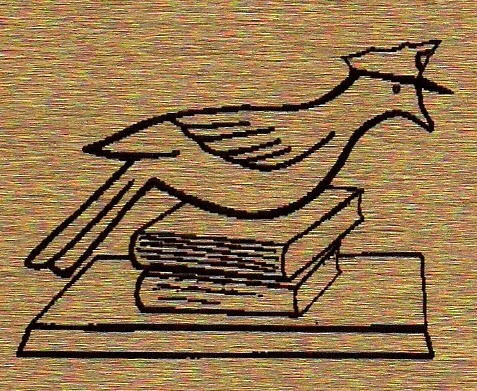
I am honoured to be able to report that the Popular Culture Association of the United States has awarded me this year's George N. Dove award. The PCA has been in existence for more than half a century, but I imagine that some British readers will be unfamiliar with it, so this is its stated mission: 'to promote the study of popular culture throughout the world through the establishment and promotion of conferences, publications, and discussion. The PCA actively tries to identify and recruit new areas of scholarly exploration and to be open to new and innovative ideas. PCA is both inter-disciplinary and multi-disciplinary. Finally, the PCA believes all scholars should be treated with dignity and respect.'
As for the award, bestowed for 'outstanding contributions to the serious study of mystery, detective, and crime fiction', is named after George N. Dove. He was a past president of the Popular Culture Association, and author of outstanding books on detective fiction. I have some of them in my possession and two of them feature in the select bibliography of The Life of Crime.
Naturally, most of the previous winners have been Americans, and they include such luminaries as Professor Doug Greene and Janet Rudolph of Mystery Readers International. Among the British winners have been P.D. James, H.R.F. Keating, and Julian Symons. Suffice to say that I am proud to be in such company.
It is always a great honour to have one's writing recognised and to be appreciated by such a notable American organisation gives me a special thrill. The detailed nominations made wonderful reading - a marvellous boost to morale and hugely motivating. Onward and upward!
March 17, 2023
Forgotten Book - The House of Care
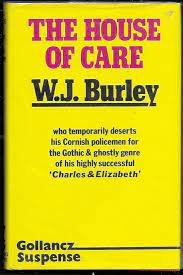
W.J. Burley's style of writing is low-key and therefore perhaps an acquired taste. Over the years, I've had several phases of enthusiasm for his work, interspersed with times when I've neglected his fiction for other fare. But I'm definitely in a Burley mood at present, and I've just read a book which has probably impressed me more than any of his other fiction.
The House of Care is a stand-alone, first published in 1981 and much less well-known that his Wycliffe series, even before the latter was televised. After this novel was published, Burley produced no more stand-alone novels, even though he continued writing until the end of his life; he died in 2002 at the age of 88, with the aptly titled Wycliffe and the Last Lap unfinished. My guess is that he was disappointed by the relative lack of appreciation for his stand-alones; the commercial potential of the series was bound to be greater unless he had a 'breakthrough' non-series book.
It's a pity that The House of Care wasn't more successful; I think it would make good television. John Cooper tells me that when he met Burley (something I never did), the author was asked by a number of American fans unfamiliar with his work which of his books he would recommend. His answer was - The House of Care. Interesting.
The setting is a decaying family estate in Cornwall. The Care family is struggling financially and Sir Henry Care has a complex personal life. Burley introduces a large cast of characters and a family tree would have been welcome. But he presents members of different generations in a credible and interesting way. As with so many of his books, sexual tensions seethe not far below the apparently pleasant surface of life on the estate.
The mood darkens as Sir Henry's daughter Laura, a young woman with a taste for the occult, becomes increasingly obsessed by the mysterious death of her mother, who plunged from Prospect Tower when Laura was a child. Several people are given good reason to want Laura dead and when a revolver goes missing, we fear the worst. Yet when a violent death occurs, it isn't by shooting...
I found this an intriguing read. The ending is subtle, and some would say ambiguous, but it works pretty well in my opinion. Perhaps this story would have enjoyed greater acclaim if it had been a little more dramatic in style, but it offers plenty to admire in terms of writing, characterisation, and evocation of place. And the plot, not always Burley's strong point, is pretty good too. Definitely deserves to be better known.
March 15, 2023
Showstopper by Peter Lovesey - review
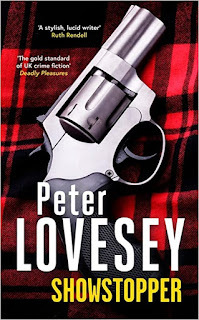
Peter Lovesey is the only writer living in Britain who has received the two top crime writing awards - the CWA Diamond Dagger and MWA Grand Master award. Showstopper, his latest Peter Diamond novel shows that he remains in fine form. We all know that when a series has been running for a long time, the books can become repetitive. But that isn't a trap that Lovesey has ever fallen into. This is another unorthodox story, very different in style and content from Diamond's last outing, Diamond and the Eye, and as entertaining as it is devilishly readable.
At the start of the book, Daisy Summerfield, a veteran member of the cast of the successful TV series Swift, goes home and is confronted by a burglar. Daisy dies and this is the latest in a long series of misfortunes plaguing the series - there have been accidents, people have gone missing, and so on, over a period of years.
Diamond investigates at a time when he's wondering if he should bring the curtain down on his crime-solving career. At first he is sceptical about the so-called jinx on Swift, but when his colleague Paul Gilbert witnesses another serious mishap, he begins to revise his opinion.
Lovesey cleverly blends traditional elements with up-to-date material (dashcam footage plays an important part in the storyline) and manages to keep the reader guessing about what is really going on. When you take risks, as Lovesey does so admirably, and keep trying something different, there's always the chance that the occasional book will misfire (and if it happens, I think it's a matter for commiseration, not complaint.) But Showstopper is a highly enjoyable mystery that reminds us that very few British crime writers have ever maintained such high standards for as long as Peter Lovesey.
March 12, 2023
A Bigger Splash - 2015 film review

I came to watch A Bigger Splash via a circuitous route. I decided to track down a song which I loved as a teenager. This was 'Ask Yourself Why' - there's a lovely performance by Sally Stevens on YouTube - and although Sally was one of Burt Bacharach's concert singers (and co-wrote one or two songs with him) in this case the composer was the great Frenchman Michel Legrand. He wrote it at roughly the same time as 'Windmills of Your Mind', but this song was much less successful, despite the gorgeous melody and crafty lyrics by the Bergmans.
I discovered that the song was written for the soundtrack of a 1969 film La Piscine, starring Alain Delon and Jane Birkin, of whom I'm a real fan. It's a well-regarded film and I want to watch it, but in the meantime I learned that A Bigger Splash is a loose remake and even if the music isn't quite as good as Legrand's, it's well worth watching in its own right.
Tilda Swinton plays Marianne, a rock singer who is recovering from a throat operation on the Sicilian island of Pantelleria in the company of her lover Paul (Matthias Schoenaerts). It all seems quite lazy and idyllic until their old friend Harry (Ralph Fiennes) invites himself along, together with his daughter, the coquettish Pen (Dakota Johnson). Harry is Marianne's former lover and soon sexual tensions are simmering.
This is a story of psychological suspense with a crime at its heart, but it's essentially a drama of character rather than a mystery. It's well-made, but outstays its welcome - the later scenes are anti-climactic. However, the acting is enjoyable, with Fiennes playing a very different character from the stiff upper lip types we might associate him with. I look forward to taking a look at La Piscine and comparing the two films.
March 10, 2023
Forgotten Book - The Milliner's Hat Mystery
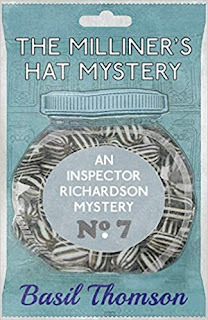
I was sorry to learn of the sudden death this week, from a heart attack, of Rupert Heath. Rupert Heath was a literary agent (whose clients included A.K. Benedict among others) but some years ago he diversified into publishing. Dual operation as agent and publisher is an interesting concept that I know has been discussed quite extensively in publishing circles in recent years. It seems fitting to pay tribute to him by featuring one of his books today, but first let me offer a brief personal perspective on Rupert's publishing activities.
Rupert set up Dean Street Press, which among other things enable him to revive 'classic crime' titles. As he said, he was inspired by the success of the British Library Crime Classics, but he took a different approach. His main focus was on ebooks, since as he said to me right at the outset, print on demand copies require various things from a publisher that are not relevant to an ebook. However, like most book lovers he was keen on print and he did decide to make print on demand copies available for those who wanted them. This method of focusing on ebooks meant that he was able to produce long runs of titles by fairly obscure and long out of print authors, without the investment required by a focus on print. The huge upside is that it became possible to obtain, easily and cheaply, copies of very rare books that were otherwise more or less unobtainable. The downside is that you will not often find copies in bookshops, but that doesn't matter if you are a completist who knows what you are looking for. The British Library model focuses on bookshop sales here and overseas, but there is room for different approaches (another good one was the Collins Detective Story Club series of hardbacks, currently paused).
Looking back, I'm surprised to realise that I first talked with Rupert about his plans as long as 2014 and we were in touch regularly thereafter. He asked me to write some introductions to Dean Street books and although pressure of other commitments meant I wasn't able to do many of these, I did contribute to two of his series, the Richardson series by Sir Basil Thomson, and two books by Winifred Peck. He regularly directed me to some of the more interesting titles in his list, including one or two of the under-rated novels of Brian Flynn (reviving these has been a labour of love for Steve Barge, and although I'm not quite as big a fan of Brian as Steve is, I've discovered there is real merit in some of the books). I find it helpful to have that kind of guidance, since very few of us are going to want to wade through the complete works of such prolific and highly variable authors as, say, Brian, or Patricia Wentworth or Christopher Bush.
One thing that impressed me was that Rupert cared about the books he produced and from a professional point of view, he was very good to work with (maybe his experience as an agent helped him to see things from the author's perspective). He gave me lots of background info about Sir Basil Thomson, for instance, that I found very interesting as well as helpful.
Which brings me to The Milliner's Hat Mystery. This is by far Thomson's most influential work - it's actually name-checked in the excellent recent film Operation Mincemeat. In this story, Inspector Vincent takes centre stage, with Richardson, the series protagonist, a background figure. Thomson was good at showing readers the ensemble nature of professional detective work - and having been a Scotland Yard supremo, he was well-equipped to do so. The story is a quick read with a very strong central idea.
And for the completists among you, here's a list of the Richardson books:
Richardson’s First Case (1933) – originally PC Richardson’s First Case
Richardson Scores Again (1934) – retitled Richardson’s Second Case in the US
The Case of Naomi Clynes (1934) – originally Inspector Richardson CID, retitled The Case of Naomi Clynes in the US
The Case of the Dead Diplomat (1935) – originally Richardson Goes Abroad, retitled The Case of the Dead Diplomatin the US
The Dartmoor Enigma (1935) – originally Richardson Solves a Dartmoor Mystery, retitled The Dartmoor Enigma in the US
Who Killed Stella Pomeroy? (1936) – originally Death in the Bathroom, retitled Who Killed Stella Pomeroy? in the US
The Milliner’s Hat Mystery (1937) – originally Milliner’s Hat Mystery, retitled The Mystery of the French Milliner in the US
A Murder Arranged (1937) – retitled When Thieves Fall Out in the US
March 6, 2023
Christopher Fowler R.I.P.
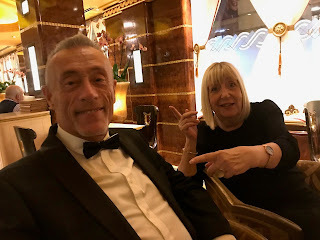
High-calibre crime writing suffered a grievous loss with the death last week of Christopher Fowler. As is well-known, Chris had been suffering from cancer from some time. He and I have for many years shared a literary agent - first Mandy Little and then James Wills - and it was Mandy who first drew his work to my attention almost twenty years ago, sending me a book of his short stories, Demonized. He was a versatile writer, as accomplished an exponent of non-fiction (such as Film Freak) as he was of different forms of fiction. From then on, we corresponded intermittently, but much more regularly in recent years.
He was a Londoner who knew the city inside out and his love of London shone through in his Bryant and May mysteries. The series began in 2004 with Full Dark House - I was lucky enough to snaffle a first edition and was immediately impressed. In all, the series ran to twenty titles. It's great fun and GA fans might like to know that his enthusiasm for Edmund Crispin and The Moving Toyshop influenced The Victoria Vanishes.
I didn't get the chance to see Chris very often, but he was excellent company and I always enjoyed our occasional get-togethers. He contributed several short stories to anthologies that I edited and each was delightfully crafted and a joy to read. We also shared a great interest in obscure writers, which in Chris' case surfaced in Invisible Ink and The Book of Forgotten Authors.
Chris had been unwell for some time prior to his election to membership of the Detection Club. However, he responded well to unlicensed, experimental treatment and was in wonderful form on the occasion of his initiation at the Ritz in October 2021. He, his fellow initiate Lynne Truss, his husband Pete, James Wills and I had a great couple of hours after the dinner, chatting in the bar until it was throwing-out time. I took the photo above of Lynne and Chris that night.
At the end of January, Chris sent me a very kind and poignant email. He was housebound, but still able to do a little writing. He told me he'd completed his collection of my anthologies and added, in a memorable phrase, 'I hope we meet again in libraries yet undiscovered.' And he said he had three more books waiting to be published - good news for all his fans, who will miss him and his work a great deal.
March 3, 2023
Forgotten Book - The Cast to Death

The Cast to Death is an obscure and very hard-to-find detective novel published by Ernest Benn in 1932. Benn, who published Dorothy L. Sayers and E.R. Punshon before their former M.D. Victor Gollancz lured their stars away, were good at talent-spotting and they evidently saw potential in the author, Nigel Orde-Powlett. As things turned out, however, he published only one further detective novel which (unlike this one) didn't achieve publication in the US. Both are listed in Bob Adey's Locked Room Murders.
Dorothy L. Sayers, so often a stern judge, had good things to say about Orde-Powlett's two novels. The only online review I'm aware of is by John Norris on the excellent Pretty Sinister blog (which is where I found the vivid cover image). As John mentions, Orde-Powlett was a member of the landed gentry. The family seat is Bolton Abbey in Yorkshire and perhaps he was distracted from writing by his social and family duties. He did, however, publish a book about practical forestry in the 1950s, which surprise, surprise, I haven't read.
The Cast to Death is set not in Yorkshire but in Hampshire and I did wonder if his fictional setting was inspired by the River Test, also the inspiration for Cyril Hare's setting in Death is No Sportsman. Like Hare's later book, this one is about angling. In fact, there's a great deal of information, material to the plot, about angling. I've no interest in angling at all, but the smoothness of the writing kept my attention.
For a debut novel, I'd say this is a good effort. A businessman called Lenton is murdered while out fishing, although there is some mystery about the wounds he suffers. He was on holiday with three angler friends; one appears to have a solid alibi, leaving the other pair as the prime suspects. The police think they have a strong case against one of them, but a young sleuth called Tony Rillington has other ideas. There are one or two weaknesses, but I liked this book more than John did. My thanks go to Jamie Sherwin for encouraging me to read it. Now I'm in search of Orde-Powlett's second mystery...
March 1, 2023
A Quiet Place - 2018 film review
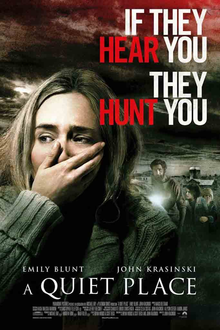
A Quiet Place is a horror film which is rather more sophisticated than many movies in the horror genre. It's enjoyed a huge amount of success and a sequel has been made. The director is John Krasinski and he stars as well, alongside Emily Blunt. They play Lee and Evelyn Abbott, a married couple - and they are married in real life. I felt their performances were very good.
Together with their three children, Regan (who is deaf) and Marcus and Beau, the Abbotts have survived a global catastrophe. Blind aliens with exceptional hearing and vile tempers have taken over the planet and most people have succumbed to their murderous rampages. The Abbotts live in a remote spot in the forest and communicate by sign language. Generally, they are forced to take extreme measures to avoid making the sounds that will enable the creatures to hear and then kill them.
The film begins - well, quietly, I must say, before a terrible and dramatic moment of tragedy occurs. We then move forward in time by about a year. Evelyn is now pregnant (so what will happen when the new-born child cries? we wonder). The Abbotts are just about coping, but their lives are still severely constrained by the need not to make a sound that will attract the aliens.
This isn't a film that overdoes the melodrama. In fact, if anything it errs in the other direction and its claustrophobic mood is strangely low-key until near the end. I'd have liked more backstory and as a result of its absence, my response to the film is probably more subdued than that of its most fervent devotees. But it's a pretty good movie and, above all, an interesting and capable example of the 'less is more' style of writing.
February 27, 2023
The Mysterious Art of Bookbinding and Bookdealing - Stephen Conway interview part 1
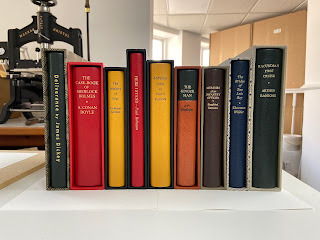
I’m currently working on a project that involves the world of books and I’ve discussed aspects of this with a number of very helpful bookdealers. Among them is Stephen Conway, whose premises in central Halifax house a splendid second hand bookshop and also a bookbinding business. Given that my first literary award was the CWA Dagger bestowed on my short story ‘The Bookbinder’s Apprentice’, you can gather that this is a subject that has long fascinated me. Stephen kindly agreed to be interviewed about his work and there is so much info of interest that I’ve split it into two posts. This one is about bookbinding. Another, on second hand bookdealing, will follow at a later date.
1. How did you get involved with bookbinding?
I have been involved in Bookbinding now for almost 50 years, starting with a six-year apprenticeship in 1974. I became self employed in 1985 and have been running a small hand bookbinding business ever since. Over the years, we have worked on a variety of high profile
Projects, including The Booker Prize and The Highgrove Florilegium, a limited edition fine binding of 350 copies (2 volumes) for the Prince of Wales Trust. Over the years, we have worked on many Private Press editions, as well as bespoke boxes, in either cloth or leather for rare and valuable books. In fact, this has now become a large part of our work load. Whilst the world climate is an everchanging landscape, thankfully, the demand for high quality work still remains.

2. What is the appeal to you of being a bookbinder?
Not being an academic and coming from a working-class family, I needed to find an outlet for my interest in arts and crafts. I had ambition to attend Art College, however, this never materialised and eventually I started work as an apprentice bookbinder, working mainly on account books, still in use in the early seventies. Luckily, this turned out to be a good move as I was able to develop my craft skills, and later, put those skills to artistic use through design bookbinding. Later in life,I served a four year term as President of Designer Bookbinders, a society devoted to the art and craft of bookbinding.

3. Some people might think bookbinding is an old-fashioned craft. Do you think it is a dying art or does it have a real future?
Although working methods and techniques are constantly improving and advances made, the basic techniques and materials remain unchanged. As a commercial venture, perhaps hand bookbinding is not an obvious choice, but it is an extremely rewarding career option for young people coming into the trade. I would say that hand bookbinding is as popular now as ever, if not, more so.
4. From a bookbinder’s point of view, what are the main do’s and dont’s about getting a book professionally bound?
There are no easy answers to this, as much depends on who is looking to have work done, be it a member of the public with a family heirloom or Bible, a bookdealer or a private collector. The criteria for each of these varies. Family heirlooms are repaired and restored so that they can be passed down to future generations. For a bookdealer, original condition is important and if work is required, must be sympathetic and in keeping with the book. As for collectors, particularly collectors of modern books with dust jackets, again, they look to finding the best copy available, with the condition of the dust jacket being an important aspect in terms of its appeal. In these instances, we make book boxes, either cloth or leather, lined with archival materials to protect the book from further damage, including sunlight fading, particularly jacket spines. Sometimes, the book may need totally rebinding, but all options must be explored with discussion between the client and the binder.
5. And from a customer’s point of view, what are the main do’s and don’ts?
The only thing I would say is keep an open mind and explore the available options. Each book is different and has to be looked at on an individual basis. In today’s climate, costs have increased significantly, so making the right choices is important.

February 24, 2023
Forgotten Book - To Die Like a Gentleman
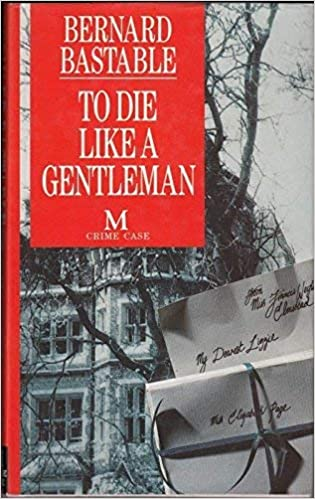
When Robert Barnard published To Die Like Gentleman in 1993, he did so under the pen-name Bernard Bastable, and so he inscribed a copy to me: 'The start of a new life!' He'd moved to a different publisher (Macmillan) for this one, and he'd also moved into the early Victorian era - the events of the story take place in 1842. So he was seeking to differentiate this book from his other work, although naturally it displays his trademark wit and crisp, economical characterisation. There's even a good joke involving Charlotte Bronte - and Bob was a lifelong devotee of the Brontes.
In fact, his new life as Bastable wasn't particularly extensive. As far as I know this book never made it into paperback.The next Bastable title was published by Little, Brown and featured Mozart as a detective, and although there was a follow-up Mozart title, the books didn't make a huge impression. The fourth Bastable, A Mansion and its Murders, was another historical mystery, at first published only in the US. I believe it was turned down by Little, Brown. Some years later, when Bob had moved to Allison & Busby, they published the book, but I think by then that he'd become frustrated - understandably - at the relative lack of interest in the Bastable titles. This just goes to show that even a leading writer can find the going tough at times.
I enjoyed reading To Die Like a Gentleman the first time around and did so again on a second reading, having forgotten the story completely after a thirty year gap. Bob may have been trying to emulate Julian Symons' Victorian mysteries and he adopts the epistolary style, with letters and documents supplementing a multiple-viewpoint narrative. A homage to Wilkie Collins was perhaps in his mind, though this book is a fraction of the length of The Moonstone and The Woman in White.
This is a readable and entertaining piece of fiction. So why didn't it make an impact? I think there are two connected reasons. First, like all Bob's novels, it's short (very short, in fact) and snappy, but although the characters and situations are interesting, the mystery element is relatively thin. Bob didn't like to over-complicate his books - 'second murders are always vulgar', he liked to say, not that I agree! - and so he didn't manage to match Agatha Christie, whom he admired so much, in terms of ingenuity, even though clever ideas abound in his work. And second, in this book, the ending is far too abrupt - almost as if he'd passed a deadline and needed to wrap everything up sharpish. This doesn't do justice to the leisurely build-up. But his books are fun and I was glad to read this one again.



